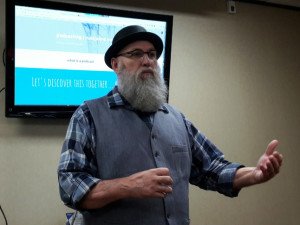Tracy: I’m sitting down today with serial entrepreneur and intrapreneur, Russ Johns. Russ, welcome, it’s great to get a chance to learn from you. I’ve been wanting to do this for a long time and I know everyone will get a lot of value from your experience. Can you start with your backstory?
Russ: Certainly. I started my entrepreneurial journey at a very young age. The first time I earned money was mowing lawns and babysitting. Then I started playing drums at age 11 and started playing professionally at 16. When you’re a drummer and making good money playing music and teaching drum lessons, life is good.
One early example of seeing an opportunity and developing it into a business was in my twenties and married. We owned horses and had them boarded at a stable near our home. At the time, we didn’t have any property, so we had to take care of the horses, clean and muck stalls and replace the bedding. Many of the owners used the straw, it wasn’t very easy to maintain or to clean, but it was available. I started asking what the owners would prefer for bedding. Everyone wanted wood shavings.
Well, I grew up in a construction environment and knew a little about the industry and started to investigate the options for wood shavings. Well, I soon tracked down two locations that made wood shutters and window coverings. The wood was high-quality pine and the byproduct made really, really, nice shavings.
Everyone wanted to buy my shavings, and I contracted with two mills to haul all of the shavings away in exchange for exclusive rights. This meant that I had to hustle for clients, and there were times I had to hustle for more shavings. It paid for the horses, and I was able to deliver a quality product to a very satisfied customer.
Tracy: That’s a great example of finding a need and filling it.
Russ: Since then, I’ve developed software, owned two different working farms where we sold fresh eggs, pastured pork, and poultry from. I wrote grants to protect the salmon watershed and start a farmers market. We planted Lavender, blueberries and heirloom potatoes to sell at the market.
Tracy: You’re an amazing entrepreneur, but you’re also a prolific intrapreneur. Everyone understands what it means to be an entrepreneur, but we don’t hear much about intrapreneurs, innovators who are employed by someone else. Can you share some of your intrapreneurial experiences with us?
Russ: People think that if you work “for a company” you’re an employee, which is technically accurate. However, if you’re an entrepreneur, working inside of another business, you’re still thinking like an entrepreneur, and you have a keen sense when opportunity within the organization presents itself.
I was working in outdoor advertising and was living in Portland Oregon and took a fall of 36 feet and was injured and lost a lot of mobility in my right arm. Once I was able to go back to work full time I was promoted to become the Safety Director. I had the experience and the results of what NOT to do. As a result of being the Safety Director, I was also able to use my Safety skills to become a Firefighter, an EMT and teach CPR, defensive driving, forklift training and several other skills that allowed me to expand my opportunities inside and outside the company.
I was able to start to use computers to write one of the first fall protection programs in the country for our industry. I was able to reduce the insurance premiums, learn new skills and I saved the company a lot of money along the way. An employee of the year! Then there was the next opportunity since it was early 92-93 when the desktop computers were just starting to appear, I saw the next opportunity to take the entrepreneurial leap into what eventually lead me to be the IT Director for the company. Seeing the entrepreneurial rather than the employee view provided me with the ability to create a position that didn’t exist before, and then master the situation and then move on to the next opportunity in an entirely different arena and still make an impact.
I eventually worked on an enormous software project that provided me a roadmap into project management and helped to develop the best in class software used today in the industry for scheduling bus, billboard, airport, and kiosk advertising. Working on this project provided the roadmap to my getting to the corporate office and develop skills in Radio, TV Broadcasting, Sports, and Outdoor advertising.
The company sold in 2002 for $800 million.
Think like an entrepreneur even when you’re inside another organization. Create the mindset and you’ll never have to stay in your current position
Tracy: Great advice, Russ. So tell us about what you’re doing now.
Russ: I help other business owners increase their branding through Streaming Media, both Audio, and Video. I teach podcasting, and I’m Co-Host of FutureMediaTV with my business partner Marian LaSalle. I have a simple coaching program that will teach anyone that wants to start a podcast, how to launch a podcast. I show them how I teach them what needs to happen and what is required to get launched on iTunes.

